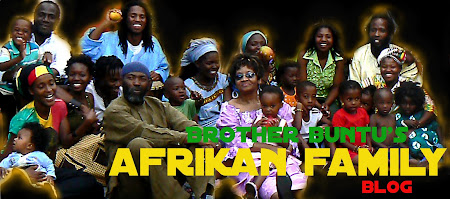For this year’s Kwanzaa celebrations in Johannesburg, South Afrika, we have chosen the theme “Preserving our Afrikan Cultural Heritage”. But, what is meant by “preserving”, and what is our Afrikan cultural heritage anyway?
Let us start by history. It is a sad fact to notice that a majority of South Afrikans today do not have much knowledge about their own history, let alone Pan-Afrikan history. Also, most are not really that interested in knowing history. History is, in most minds, associated with boring lectures on years, names and facts of no relevance to modern day life. What is the point of studying history?, many ask themselves. Hon. Marcus Mosiah Garvey provides a thoughtful reminder:
“…history is the landmark by which we are directed into the true course of life…”
This means that without knowing history we cannot really grow, expand, develop or understand our mission in life. To use the Garvey quote differently, we can say that by not knowing our history we will be directed into the WRONG course of life. Knowledge of history is a foundation in cultural identity because it locates us, it tells us where we came from and how we ended up where we are now. It gives us direction. Frantz Fanon told us that
“…every generation, out of relative obscurity, must seek to redefine itself, discover its mission, fulfil it or betray it…”
History is, of course, not the only aspect of cultural identity, but it is a fundamental one. Other aspects include ideology, behaviour, values and attitudes – which, in the Afrikan sense, is taught and developed through symbolism, practices and ritual ceremonies. Aspects that many of us have lost, forgotten or neglected. Dr Wade Nobles defined culture as:
“…a process which gives people a general design for living and patterns for interpreting their reality…”
In our recent Afrikan experience (over the last 500 years), our culture has been ridiculed, suppressed and made to appear non-functional and remote. A view many of us have adopted. Some of us now think we are clever because we excel in European languages, look fly in Western suits and drive the latest Japanese car. It is almost like some of us believe we have “transcended” Afrikan-ness; this backward, non-sensical culture of mambo-jambo. That’s how many of us feel today. Our culture is under siege, and needs to be defended. Hence, part of our “preserving” actions is to analyze what Westernization has done to us, psychologically, spiritually and economically. And this, in turn, becomes a process of rejection, as Steve Bantu Biko pointed out:
“…In rejecting Western values, therefore, we are rejecting those things that are not only foreign to us but that seek to destroy the most cherished of our beliefs – that the corner-stone of society is man himself – not just his welfare, not his material wellbeing but just man himself with all his ramifications…”
But our cultural development cannot focus only on rejection. We must be very clear about what we want to embrace. And to know that, we need to understand more about our cultural heritage. South Afrikans, psychologically and spiritually, are still wounded and scarred today. And looking for identity. This creates a platform for opportunity. An arena to operate from. To do more research. To develop and grow. But this growth must be linked with the heritage of the past, so that cultural development becomes a continuation. “Going back” does not have to mean getting stuck in the past. But to re-link with the profound knowledge or our Foremothers and Forefathers. And during Kwanzaa 2007 we want to re-link, re-awaken and re-discover. So that our wounds can be healed and we can progress to higher levels. Like Dr Amos Wilson reminded us:
“…to discover our history is to discover our somethingness (beingness) before someone else created us […and we will…] be in charge of our own becoming.”
Have a blessed and Happy Kwanzaa 2007!

No comments:
Post a Comment